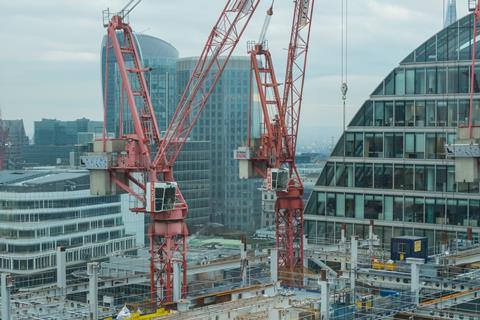However, latest data from purchasing managers shows a return to growth for construction overall
Housebuilding activity grew at its slowest pace since the middle of last year in February, despite a bounce back in construction activity overall, according to the latest data from purchasing managers.
The monthly IHS Markit/CIPS purchasing managers’ index for February saw construction acitivty in the UK return to growth after a decline in January, thanks to a resurgence in the commercial sector, which saw the sharpest rise in activity since September.
However, the housing component of the index, while still registering growth, slipped back further from the 57.1 figure recorded in January - itself the lowest number since May last year - to 56.9. Despite this, the residential sector remained the strongest sector of the construction industry.
Overall activity in February rebounded from the previous month’s disappointing performance, with the construction total activity index hitting 53. A hike in commercial work offset the slowdown in housebuilding growth, while February also represented the ninth consecutive month of growth in new orders.
In January the construction index dipped to 49.2, below the 50.0 no-change mark for the first time since last May.

Tim Moore, economics director at IHS Markit, said: “Construction work regained its position as the fastest growing major category of UK private sector output in February.
“The rebound was supported by the largest rise in commercial development activity since last September as the successful vaccine rollout spurred contract awards on projects that had been delayed at an earlier stage of the pandemic.”
The slowdown in housebuilding growth was offset by a slower fall in civil engineering activity as well as the rise in commercial work.
February’s expansion in new orders has been welcomed as an acceleration on the previous month.
Gareth Belsham, director of Naismiths, said the latest figures appear to show January’s activity dip to be a blip: “The construction industry clicked straight back into gear in February, posting a solid jump in output. More exciting still, the pace of new orders accelerated even further.
He also pointed to figures that show the rate of job creation at its fastest since March 2019.
“With construction firms steadily starting to recruit again, the industry is clearly responding to the Prime Minister’s call for Britain to ‘build, build, build’ its way back to economic growth.”
The IHS Markit/CIPS’ report also stated that sentiment among its survey respondents has been boosted to a five year high by improving order books and the feeling that the vaccine rollout will release pent up demand.
But the industry has been warned that it must not get carried away, with Mark Robinson, group chief executive at Scape, saying the sector must not be lulled into a false sense of security by the return to growth.
He said: “While the easing of restrictions is likely to stimulate an increase in output in the coming months, a steady stream of investment in communities and infrastructure is still necessary to ensure the construction industry can support and sustain long-term economic growth.
“The immediate £12bn earmarked for the Treasury’s new National Infrastructure Bank will play a vital role in that respect, but the projects this will enable need to be identified as soon as possible, if we are to achieve the regeneration needed post-pandemic.”
In fact, while activity grew and improved from January, when the index sat at 49.2, the market was still below the December level of 54.6.
Purchasing prices also boomed with respondents citing an imbalance of demand and supply, alongside inflationary pressures from the pass through of higher transportation costs as the main drivers.
Stretched global supply chains, greater shipping charges and rising commodity prices all contributed to the sharpest increase in average cost burdens across the construction sector since August 2008.
Extended supplier lead times also persisted in February as vendors struggled with transport delays and stronger demand conditions.
But Robinson added that the government’s new ”super deduction” tax relief, which was announced as part of yesterday’s budget, should also encourage contractors to invest for growth and allay fears about the increase in corporation tax











No comments yet